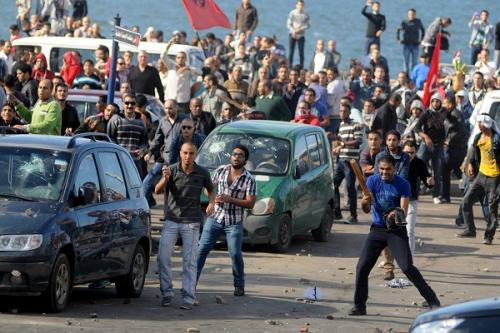
Fresh clashes have broken out in the Egyptian city of Alexandria on the eve of the second leg of voting in the country’s constitutional referendum.
Police fired tear gas as thousands of Islamists were met by a smaller group of protesters near a large mosque.
The Islamists back President Mohamed Morsi and his draft constitution. Opponents say the document has been rushed and does not protect minorities.
Alexandria voted in the first leg of a referendum that has split the nation.
The capital, Cairo, has also voted. Seventeen of the 27 provinces will cast ballots on Saturday.
Islamists in favor of the draft had called for a large rally outside the Qaed Ibrahim mosque in the centre of Alexandria.
They chanted “God is Great” and “With blood and soul, we redeem Islam”.
A smaller group of opponents chanted anti-constitution slogans and the two sides threw stones at each other.
Police formed lines to keep the groups apart and fired tear gas, with the unrest subsiding after about 90 minutes.
The state news agency Mena quoted the health ministry as saying that 32 people had been injured.
Last week an ultraconservative cleric was trapped in a mosque in Alexandria for 12 hours as his supporters battled opponents outside.
Some 250,000 security personnel have been deployed nationwide to try to keep order during the referendum.
Turnout for the first round of voting was reported to be low – just above 30%. Unofficial counts suggested some 56% of those who cast ballots voted “yes” to the draft.
The opposition has complained of a number of cases of fraud.
Analysts believe Saturday’s leg will favor a “yes” vote as the areas to vote are considered in general to be more conservative.
Egypt’s latest crisis began on November 22, when Mohamed Morsi adopted sweeping new powers in a decree, stripping the judiciary of any power to challenge his decisions.
The decree spurred protests and clashes between Mohamed Morsi’s supporters and opponents.
Under pressure, the president revoked much of the decree but only after a constituent assembly had voted through the draft constitution and it had been put to the referendum.
The opposition had demanded the referendum be postponed, saying the assembly had approved the draft despite a boycott by liberals, secularists and Christians, who believe it does not adequately protect women, freedom of expression or religion.
The opposition did not, however, call a boycott, instead urging its members to vote “no”.
If the constitution passes, elections must take place within three months. In the meantime, legislative powers would remain with Mohamed Morsi.
[youtube wdDsHeajOd4]